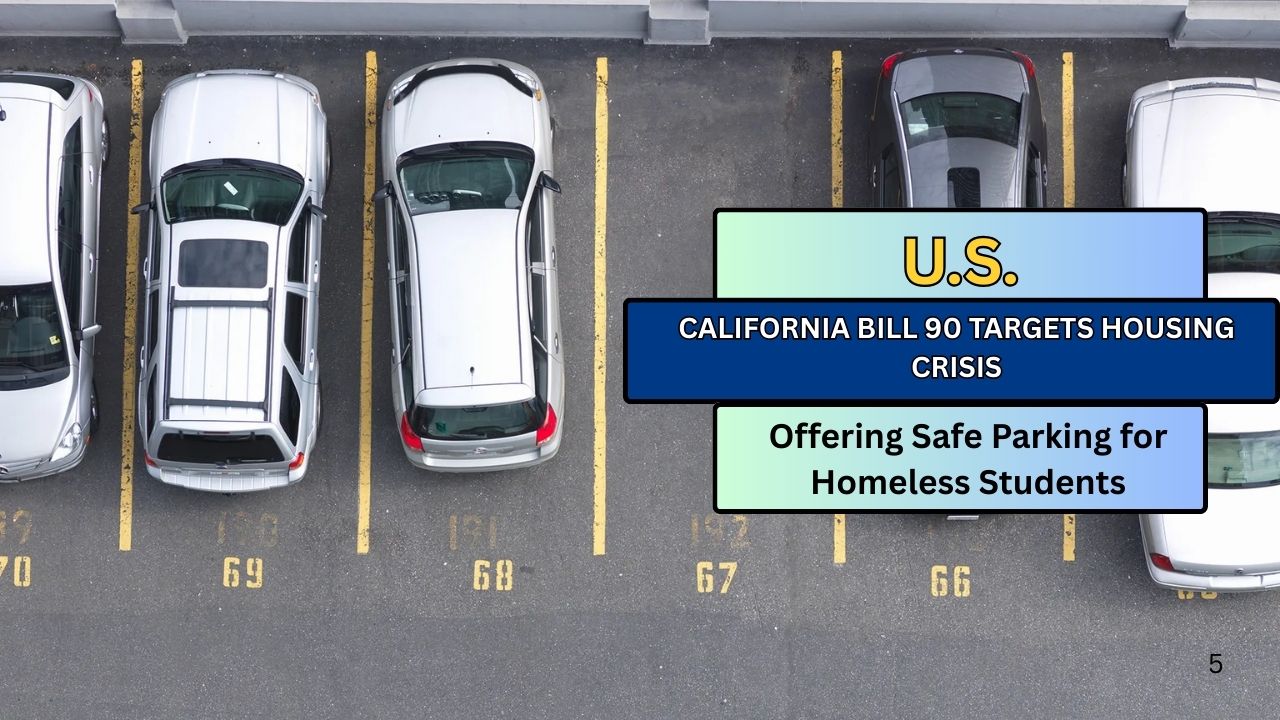California’s Assembly Bill 90 targets student homelessness by creating designated parking areas for those living in their vehicles, offering a safer option amid the ongoing housing crisis.
California lawmakers are currently evaluating Assembly Bill 90, a significant proposal to address the increasing issue of student homelessness.
The bill would equip community colleges and California State University (CSU) campuses with the resources needed to establish overnight parking programs, providing homeless students with a secure place to sleep in their vehicles.
Introduced by Democratic Assemblymember Corey Jackson, the bill gained momentum after the Assembly Higher Education Committee approved it with a 6-2 vote.
According to Newsweek, this effort is part of a larger plan to confront California’s persistent housing crisis, which continues to impact students statewide.
Addressing Homelessness Among Students
Student homelessness in California has reached alarming rates, with approximately 12% of community college students and 9% of university students affected, as reported by the Homeless Coordinating and Financing Council.
A 2023 survey by the Community College League of California revealed that nearly 60% of community college students experience housing insecurity, and one in four faces homelessness.
The bill seeks to offer a structured and safer alternative for these students, many of whom lack access to stable housing.
What Assembly Bill 90 Entails
Assembly Bill 90 would require community colleges and CSU campuses to create designated parking spaces for homeless students, ensuring these areas include security measures and bathroom facilities.
The program would emphasize safety by prohibiting alcohol, drugs, harassment, and intimidation, while encouraging students to pursue long-term housing options. Community colleges would be mandated to offer at least one lot with 50 parking spaces, with CSU campuses implementing similar initiatives if legislative funding is secured.
The bill also provides liability protection for campus employees acting in good faith and requires detailed reporting on program participation and demographics. Colleges must develop plans for these parking programs by 2026.
Concerns About Costs and Logistics
While the proposal has clear benefits, critics question the feasibility and costs of implementing the programs. California’s budget shortfall, which has reduced CSU’s state funding by $375 million annually, fuels skepticism about the bill’s viability.
Concerns have also been raised about the logistics, including the need to clear parking spaces each morning for regular campus use.
A similar bill introduced by Jackson last year (AB-1818) passed the Assembly but failed in the Senate Appropriations Committee due to high cost concerns, highlighting the ongoing challenge of balancing student needs with budget realities.
What People Are Saying
Assemblymember Corey Jackson emphasized the urgency of the bill:
“This bill confronts a harsh reality. Many of our students who are sleeping in their vehicles or other displaced settings are unable to find affordable housing. And that’s jeopardizing their education.”
Fox News host Hugh Hewitt criticized the bill during an appearance on America’s Newsroom, arguing it doesn’t address the core housing issues:
“The problem in California is there are not enough homes and apartments. It’s a supply problem created over 50 years of no-growth, left-wing policies that are anti-housing. The solution is not to create homeless encampments, and each one of these will become that.”
He further added:
“People are going to enroll in the community college for 18 bucks a credit, and then they’re going to put their car in the community college parking lot.”
Community College League of California policy manager Nune Garipian also voiced concerns about the financial and administrative strains:
“Establishing an overnight student parking program would require significant financial and administrative resources to ensure that students have a safe, clean, and secure place to sleep at night.”
He added:
“Our colleges, unfortunately, just do not have these resources available.”
What’s Next for Assembly Bill 90?
The bill remains in its early phases. Community colleges must vote on adopting the programs by 2026, while CSU implementation hinges on receiving legislative funding.
Assemblymember Jackson remains optimistic, believing the bill addresses the difficult reality faced by many homeless and housing-insecure students who struggle to continue their education due to unstable living conditions.
While advocates support the bill as a crucial step toward addressing student homelessness, its success will depend on overcoming logistical challenges and securing the necessary funding.
This article has been carefully fact-checked by our editorial team to ensure accuracy and eliminate any misleading information. We are committed to maintaining the highest standards of integrity in our content.

Outside of work, he enjoys playing chess, following cricket, and writing short stories. His commitment to integrity and in-depth analysis strengthens OTE News’ mission of providing trustworthy journalism.




